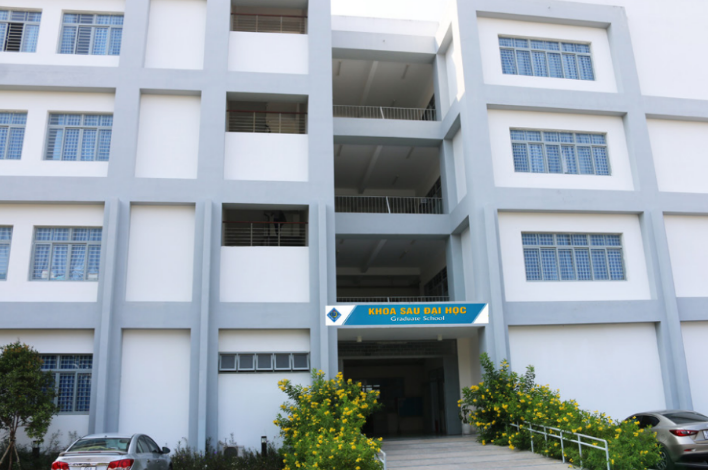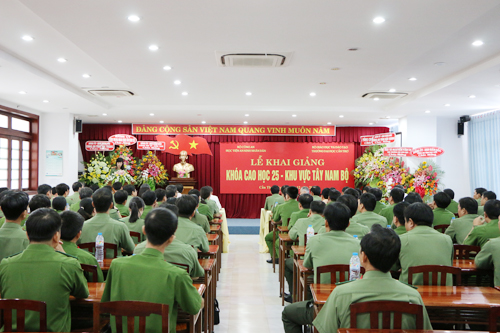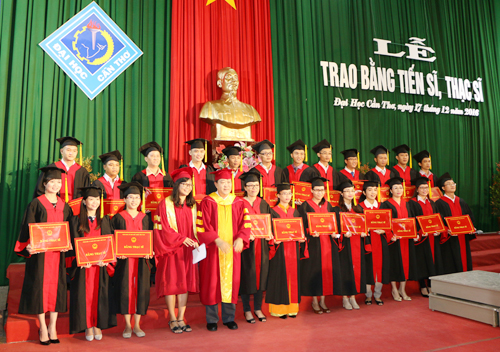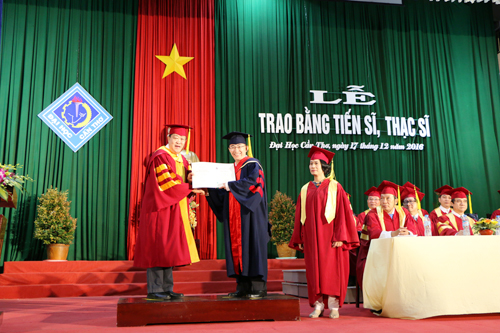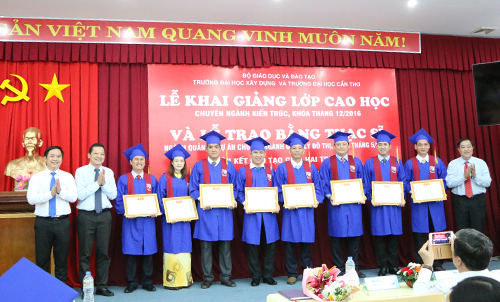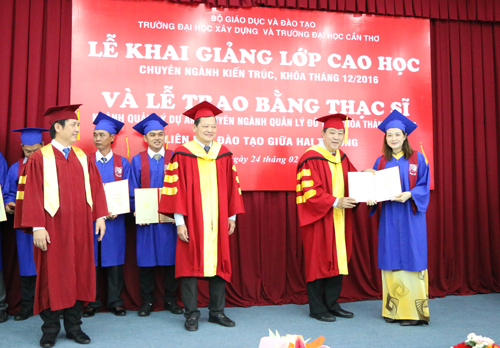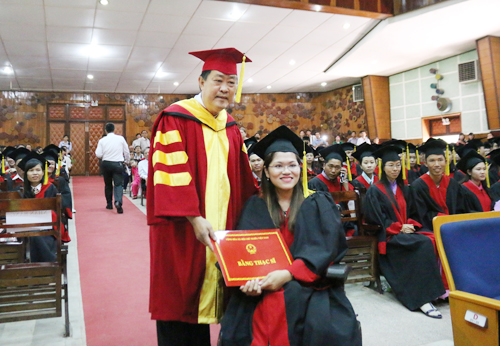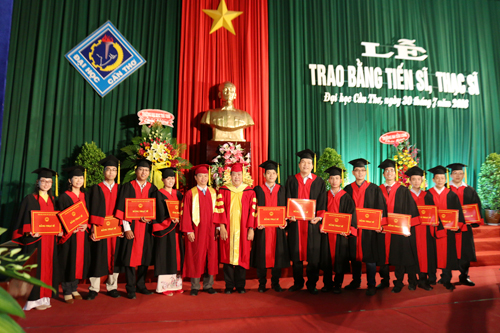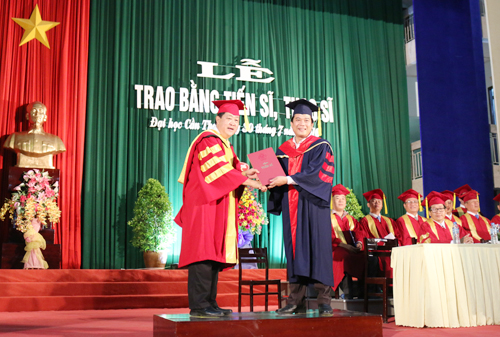
 Tên đề tài: “Tuyển chọn chủng Bacillus subtilis ứng dụng trong phòng bệnh nhiễm khuẩn đường tiêu hóa trên gà”.
Tên đề tài: “Tuyển chọn chủng Bacillus subtilis ứng dụng trong phòng bệnh nhiễm khuẩn đường tiêu hóa trên gà”.
 Tác giả: Lê Thị Hải Yến, Khóa: 2013
Tác giả: Lê Thị Hải Yến, Khóa: 2013
 Chuyên ngành: Bệnh lý học và chữa bệnh vật nuôi; Mã số: 9640102; Nhóm ngành: Nông-Lâm-Ngư nghiệp.
Chuyên ngành: Bệnh lý học và chữa bệnh vật nuôi; Mã số: 9640102; Nhóm ngành: Nông-Lâm-Ngư nghiệp.
 Người hướng dẫn chính: PGS.TS. Nguyễn Đức Hiền, Chi cục Thú y TP Cần Thơ.
Người hướng dẫn chính: PGS.TS. Nguyễn Đức Hiền, Chi cục Thú y TP Cần Thơ.
1. Tóm tắt nội dung luận án
Đề tài “Tuyển chọn chủng Bacillus subtilis ứng dụng trong phòng bệnh nhiễm khuẩn đường tiêu hóa trên gà” được thực hiện với mục đích phân lập chủng vi khuẩn B. subtilis có tiềm năng probiotic thích hợp cho gia cầm từ đất và phân của trại gà. Nghiên cứu này nhằm tìm biện pháp mới thay thế kháng sinh trong phòng và trị bệnh, nâng cao năng suất, hiệu quả trong chăn nuôi gà công nghiệp, giảm bớt nguy cơ lan rộng các dòng vi khuẩn kháng kháng sinh trong tự nhiên.
Đề tài đã phân lập được 296 chủng vi khuẩn từ 70 mẫu đất và 70 mẫu phân gà thu thập tại các trại gà thuộc 7 tỉnh, thành vùng ĐBSCL. Các chủng vi khuẩn này được chọn lọc qua kiểm định sinh lý, sinh hóa với các chỉ tiêu như: âm tính với lecithinase, dương tính với catalase, amylase, cellulase, VP (Voges-Proskauer), và chịu nhiệt cao (phát triển được ở 50oC); và được định danh bằng bộ kít API CH50B (Biomerieux-France) kết hợp với kỹ thuật sinh học phân tử giải trình tự gen 16S rRNA (sử dụng phần mềm BLAST so sánh trình tự gen trên cơ sở dữ liệu NCBI). Kết quả phân tích cho thấy đã chọn ra được 21 chủng vi khuẩn đạt chỉ tiêu về mặt sinh lý, sinh hóa theo yêu cầu và về mặt định danh có mức độ tương đồng của gene 16S rRNA cao (≥99%) với B. subtilis. Nhằm tuyển chọn chủng vi khuẩn có tiềm năng probiotic, 21 chủng B. subtilis tuyển chọn đã được khảo sát các đặc điểm đặc trưng cho vi khuẩn probiotic như: tính nhạy cảm kháng sinh (erythromycin, gentamycin, neomycin, oxytetracyclin, doxycyclin, colistin, sulfadimidin - trimethoprim, norfloxacin, enrofloxacin), tính chịu nhiệt (phát triển ở nhiệt độ từ 50-60oC), khả năng sinh enzyme ngoại bào (amylase, protease, lipase), khả năng ức chế vi khuẩn gây bệnh (E. coli, S. enterica, Staphylococcus spp., Streptococcus spp.), khả năng chịu pH acid dạ dày (pH 2,0), khả năng chịu muối mật 0,3%, khả năng bám dính (tự bám dính, bám dính với vi khuẩn gây bệnh, bám dính tế bào biểu mô ruột) và khả năng sống được trong đường tiêu hóa gà. Kết quả cho thấy trong 21 chủng vi khuẩn khảo sát, B. subtilis VL28 thể hiện tốt nhất các đặc tính probiotic, do vậy chủng này được chọn để sử dụng trong thử nghiệm thức ăn bổ sung probiotic cho gà. Vi khuẩn B. subtilis VL28 mật độ 107 CFU/g với liều lượng 5 g/kg thức ăn được bổ sung vào thức ăn cho gà ở độ tuổi 1-56 ngày cho thấy hiệu quả tăng trọng của gà đạt 11,7%, đồng thời lượng thức ăn sử dụng giảm 16,8% so với đối chứng nuôi bằng thức ăn không bổ sung vi khuẩn. Bên cạnh đó, gà 18 ngày tuổi lây nhiễm với S. enterica (liều 7,5x104 CFU/mL/gà) và E. coli (liều 5,0x106 CFU/mL/gà), được nuôi với thức ăn có bổ sung B. subtilis VL28 với liều như trên có khả năng tăng trọng và tỉ lệ sống tương đương với điều trị bằng kháng sinh enrofloxacin và oxytetracyclin. Các kết quả này cho thấy chủng B. subtilis VL28 phân lập và tuyển chọn được trong đề tài này có tiềm năng probiotic rất lớn, chủng này có thể sử dụng để thay cho kháng sinh trong việc phòng và trị bệnh đường tiêu hóa ở gia cầm.
Trình tự gen 16S rRNA của B. subtilis VL28 đã được đăng ký trên ngân hàng gen của NCBI với mã số truy cập là KY346980.
- Những đóng góp mới của luận án
Luận án là công trình nghiên cứu đầu tiên chọn lọc được chủng B. subtilis bản địa có hiệu quả trong phòng bệnh đường tiêu hóa trên gà tại vùng Đồng bằng sông Cửu Long, đặc biệt là bệnh do S. enterica và E. coli gây ra.
- Là công trình nghiên cứu, phân lập, tuyển chọn vi khuẩn probiotic một cách hệ thống theo tiêu chuẩn Quốc tế.
- Đã phân lập và giám định chính xác 21 chủng B. subtilis bản địa từ phân và đất chuồng gà ở khu vực ĐBSCL và tuyển chọn được chủng VL28 có thể sử dụng làm probiotic trên gà.
- Đã chứng minh bằng thực nghiệm việc bổ sung chủng B. subtilis VL28 107 CFU/g với liều 5g /kg thức ăn có khả năng thay thế kháng sinh ngăn ngừa quá trình nhiễm trùng đường ruột ở đàn gà được gây nhiễm thực nghiệm với S. enterica và E. coli, đồng thời làm tăng mức tăng trưởng cũng như giảm hệ số chuyển hóa thức ăn so với gà đối chứng.
- Đã được ngân hàng gen NCBI công nhận trình tự gen 16S rRNA của B. subtilis VL 28 với mã số truy cập KY346980.
(có thể truy cập trên trang web https://www.ncbi.nlm.nih.gov/nuccore/ky346980)
- Các ứng dụng/khả năng ứng dụng trong thực tiễn, các vấn đề cần tiếp tục nghiên cứu
Ý nghĩa thực tiễn
Chọn lọc được chủng B. subtilis bản địa có tiềm năng dùng làm probiotic phù hợp với điều kiện chăn nuôi tại Đồng bằng sông Cửu Long. Kết quả nghiên cứu của đề tài dùng ứng dụng trong sản xuất chế phẩm probiotic, phòng chống bệnh đường ruột gia cầm, làm tăng năng suất chăn nuôi đem lại lợi nhuận cao cho người chăn nuôi. Tạo cơ sở khoa học để đề xuất hạn chế sử dụng kháng sinh làm chất kích thích tăng trưởng và phòng bệnh trong chăn nuôi. Góp phần tạo được nguồn thịt gia cầm sạch, không tồn dư kháng sinh, bảo vệ sức khỏe cộng đồng.
Những đề xuất
- Mở rộng nghiên cứu ứng dụng chủng subtilis VL28 trong phòng và trị bệnh nhiễm khuẩn đường tiêu hóa như Salmonellosis, Colibacillosis, Necrotic Enteritis … trên thực địa ở qui mô công nghiệp.
- Tối ưu hóa qui trình lên men thu sinh khối subtilis VL28 nhằm sản xuất vi khuẩn probiotic với mật độ cao, giá thành rẻ.
- Xây dựng chiến lược bảo quản giống và sản xuất chế phẩm góp phần tăng năng suất vật nuôi và tạo được nguồn thịt gia cầm sạch, không tồn dư kháng sinh, bảo vệ sức khỏe cộng đồng.
- Summary
The dissertation “Isolation of Bacillus subtilis and its application on the prevention of intestinal diseases in chicken” was carried out to isolate, from soil and fecal samples at intensive chicken farms, the B. subtilis strains with probiotic potential. This study aimed to find out alternatives for antibiotics in the prevention and treatment of intestinal diseases as well as to increase productivity and effectiveness in poultry industry and also to reduce the risks of spreading antibiotic resistant bacteria in nature.
From 70 soil samples and 70 fecal samples of chicken farms from 7 provinces in the Mekong Delta, 296 similarly B. subtilis bacteria were isolated. These isolates were analyzed further for B. subtilis’s characteristics by physio-biological tests with the following criteria such as: negative in lecithinase, positive in catalase, amylase, cellulase, VP (Voges-Proskauer), and temperature tolerance (being able to grow at 50oC); and identified by the API CH50B kit (Biomerieux-France) in combination with the bio-molecular technique namely partial sequencing of 16S rRNA (using BLAST alignment with the known sequences on the NCBI genbank). The results showed that there were 21 isolates which satisfied the required physio-biochemical criteria, and the strain identification revealed that the similarity of gene 16S rRNA was high (≥99%) with B. subtilis. In order to select the B. subtilis strain with probiotic capabilities, 21 selected B. subtilis isolates were investigated further on the susceptibility to antibiotics (erythromycin, gentamycin, neomycin, oxytetracycline, doxycycline, colistin, sulfadimidin - trimethoprim, norfloxacin, enrofloxacin), temperature tolerance (being able to grow at 50-60oC), extracellular enzyme production (amylase, protease, lipase), bacterial pathogen inhibition properties (E. coli, S. enterica, Staphylococcus spp., Streptococcus spp.), tolerance to acidity of the gastric juice (pH 2,0) and 0. 3% bile salts, adherence ability (autoaggregation, coaggregation, adherence to epithelial cells) and survival rate in gastro-intestinal environment. The results showed that among 21 isolates observed, the strain B. subtilis VL28 exposed the best probiotic capabilities. Consequently, this strain was chosen to use as a supplement for chicken feed. The B. subtillis VL28 (the density of 107 CFU/g and the dosage at 5 g/kg of feed) was supplemented in feed for the 1-56 day old chicken. The results showed that chicken growth increased by 11,7% and feed usage decreased by 16,8%, compared with the control groups without supplementing B. subtilis VL28. Furthermore, the 18 day old chicken, infected by S. enterica (with the dosage of 7,5x104 CFU/mL/chicken) and by E. coli (with the dosage of 5,0x106 CFU/mL/chicken), then fed with B. subtilis VL28 (supplemented in feed with the above described dosage), had growth ability and mortality rates that were equivalent with the control groups treated with enrofloxacin and oxytetracycline. These results showed that the selected B. subtilis VL28 strain in our study has great probiotic potential and could be used to replace antibiotics for prevention and treatment of intestinal diseases in poultry.
The 16S rRNA partial sequence of the new B. subtilis VL28 was registered in the Genbank of NCBI with the access code KY346980.
- Novel aspects
- This research did select first the local B. subtilis strain that showed efficacies in the prevention of intestinal diseases in chicken in Mekong Delta, especially the diseases were caused by S. enterica and E. coli
- This is the scientific research on the isolation and selection of probiotic bacteria systematically based on International Standards.
- Twenty one B. subtilis isolates were correctly identified from fecal and soil samples in Mekong Delta regions. Among them, the B. subtilis VL28 was chosen to use as a probiotic strain for supplementation in chicken feed.
- B. subtilis VL28 (107 CFU/g) with the dosage of 5g/kg of chicken feed was able to replace antibiotic in treatment of intestinal diseases against S. enterica and E. coli. Also, it could increase chicken growth and reduce metabolic rate of feed usage compared with the control.
- The 16S rRNA partial sequence of the new strain B. subtilis VL 28 was approved by NCBI Genbank with access code KY346980.
(Available on the website https://www.ncbi.nlm.nih.gov/nuccore/ky346980)
- Applicability in practice and issues to study next
Applicability in practice
This study has high practical values in the production of probiotics in order to prevent and treat intestinal diseases in poultry, as well as to increase poultry performance and reduce the overuse of antibiotics as stimulating growth substances. Also, it helps to provide clean poultry meat resources without antibiotic residues, and as a result it protects community health.
Issues to study next
- Studying on application of subtilis VL28 in vivo against Salmonellosis, Colibacillosis, Necrotic Enteritis … on industrial scale.
- Optimizing fermentation conditions of subtilis VL28 to have high yield and cheap costs.
- Optimizing preservation conditions of subtilis VL28 probiotic products.
>> Xem chi tiết nội dung luận án
>> Xem thông tin đăng tải tại Website Bộ giáo dục và Đào tạo.




